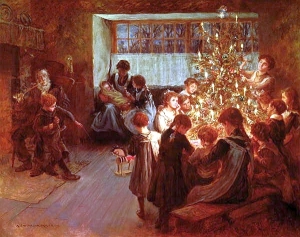In so many ways, Christmas is the best time of the year. People seem friendlier and more generous, decorations and parties abound, delicious food is served in abundance, and most people get to enjoy a much needed vacation. But many of the traditions associated with Christmas, including Christmas trees, gift giving, Santa Claus, and even the date of December 25th, have no direct biblical basis. Some are even rumored to have strongly pagan roots and may be actually opposed to Christianity! As a result, some Christians criticize these traditions while some non-Christians point out that they are just more examples of what makes Christianity fraudulent in their minds.
Well, what is the truth? Is it OK for a Christian to engage in these allegedly “pagan” practices? Are they just examples that support the notion that Christianity is just a copy of various pagan religions, as the atheist might argue? Let’s take a look at some common traditions and separate fact from fiction.
Claim #1: “Jesus wasn’t born on December 25th. That date was borrowed from earlier pagan traditions, so Christians are dishonoring Jesus to celebrate his birthday on that day.”
The fact is no one knows for sure on what day Jesus was born. Many dates have been suggested throughout history, including January 2, January 6, March 25, April 18, April 19, May 20, November 17, November 20, and December 25. In Eastern churches, January 6th was, and in some cases still is, considered the correct date. In the West, December 25th was selected, though it does not appear to have been broadly recognized as Jesus’ birthday until the 4th century.
The reasons for selecting December 25th are unclear. However, there certainly were pagan celebrations at or around that time that pre-date Christianity’s selection of the day. Pagan celebrations during late December include the winter solstice, a Roman sun festival (natalis solis invicti), Saturnalia, and the birthday of Mithras. It is possible, though not definite, that the date of December 25th was borrowed from these practices.
There is evidence that Christian churches were borrowing or adapting some pagan practices by the 4th century, once the Roman emperor Constantine legalized the religion. The general theory as to why various practices were borrowed is that it was actually a form of evangelism. If Christianity was more appealing to and comfortable for pagans, the reasoning goes, they were more likely to convert. If this was the strategy, while not advisable doctrinally, it may have been pragmatically effective as Christianity spread rapidly throughout the Roman Empire, virtually supplanting all pagan cults by the sixth century.
There is also ample evidence that a belief in December 25th as Jesus’ birthday predates the 4th century and was widespread as early as 200 AD. This date makes it less likely that December 25th was simply borrowed from others. Early church leaders including Irenaeus (130-202 AD), Hippolytus (170-235 AD), and Julius Africanus (160-240 AD) agreed with the December 25th date (or one close to it). A primary reason for this date is that some in the early church believed, based on Jewish chronologies, that Jesus was conceived on or around March 25. His birth would have been nine months later on December 25. Another rationale was the assumption that Jesus was conceived on the same date that he died (around March 25). This, too, would place his birth on December 25.
John Chrysostom, the archbishop of Constantinople, also made a case for December 25th as Jesus’ birthday in 386 A.D., based on Luke 1. Zechariah was serving in the temple when he received word of his wife Elizabeth’s conception of John the Baptist. Based on Jewish records, Chrysostom calculates this to have occurred in later September or early October. Jesus’ conception was announced during the sixth month of Elizabeth’s pregnancy, which would have likely been late March. Consequently, Jesus would have been born nine months later in late December.
In conclusion, there seems to be ample “Christian” support for recognizing December 25th as Jesus’ birthday. Christians can feel comfortable celebrating Christmas on that date or frankly, any other. There is no “wrong” day to celebrate Christ’s birth.
Claim #2: “Christmas trees are clearly pagan in origin and are even specifically condemned by the prophet Jeremiah (Jeremiah 10:1-5), so a Christian should have nothing to do with them!”
There is no question that numerous pagan religions, throughout the world, used decorated trees or boughs in their celebrations. Evergreens, in particular, were honored as representing resurrection or eternal life, or having magical powers. And Jeremiah does seem to condemn the pagan practice of cutting down and adorning trees as “worthless” and warns God’s people not to do it. So clearly, Christians should not celebrate with Christmas trees, right?
Not so fast. It is possible, but not definite, that the Christmas tree has pagan roots (sorry, bad pun). But it is just as likely that the Christmas tree is derived from the so-called “Paradise Tree.” The Paradise Tree came from 11th century religious plays that were performed by traveling minstrels and troubadours. One of the most popular of these plays depicted the story of Adam and Eve and their fall from grace, but also the promise of a coming Savior. These plays were often performed around the Feast of Adam and Eve on December 24th and included the “Paradise Tree” as a prop. So popular were the plays, and the Paradise Trees, that people began putting them in their homes in December. This practice likely evolved into the modern Christmas tree.
Jeremiah’s warning also seems unlikely to apply to Christmas trees. First, Jeremiah issued this warning many hundreds of years before the birth of Jesus, so it is clearly not referring directly to a Christmas tradition. Further, Jeremiah seems to be most plainly talking about idols that are carved from trees and worshipped, not used as decorations. He refers to craftsmen shaping the tree with tools and seems to indicate they have a human-like appearance. So unless a Christian is turning his or her Christmas tree into an idol and worshipping it, it seems unlikely that the Jeremiah passage applies.
Claim #3: “Santa Claus is not in the Bible! And he has stolen the real meaning of Christmas away from Jesus. Christians should have nothing to do with him!”
Santa Claus is not in the Bible. But he does have his origin in a real and very devout 4th century Christian, Saint Nicholas of Myra, from modern-day Turkey.
Saint Nicholas was known as a fierce defender of the faith and a generous gift giver to the poor. He was one of the most popular saints of all time and he quickly gained a legendary status.
However, 19th century literature (e.g. “A Visit from St. Nicholas” in 1822) and even pop culture (e.g. 1930’s Coke ads) have most heavily influenced the modern version of Santa, far over-shadowing his real-life roots.
So while one can’t truly say that Santa Claus is “un-Christian,” he’s not without some legitimate potential objections. Consequently, this tradition is one where it is best to let your conscience be your guide. Issues that Christian parents should consider regarding Santa include:
- Santa isn’t real, so you walk a fine line between what some call “make believe” and others call lying.
- Someday, you will tell your child Santa is not real. Since Santa can sound a lot like God to a child (all-knowing, supernatural powers, etc.), he or she might question God’s existence, too.
- Parents must carefully ensure that kids remember Jesus is the focus of Christmas, not Santa.
As a person who believed in Santa as a little kid, and who raised three children that believed in Santa, I think it can be done in a positive, Christian way. But there are potential watch-outs, so Christian parents should give this one some thought.
Claim #4: “Christmas has become so commercialized that it’s just about gifts and making money. Instead of giving gifts, Christians should focus on the real ‘reason for the season.’”
There’s some truth to this one. Christmas has been greatly commercialized, and in our society it can be a constant battle to keep people focused on Jesus instead of their wish list. However, there is a biblical basis for giving gifts at Christmas. This tradition is believed to have originated with the gifts offered to the Christ child by the wise men. Furthermore, the giving of gifts is done as a way of honoring and recognizing the greatest gift ever given: Salvation through faith in Christ. As long as Christians remember that Christmas is first and foremost about Jesus, and focus more on giving than receiving, gifts can and should be a part of our celebrations. They are a great way to show love for one another and honor our Lord.
Summing It All Up…
In conclusion, it is possible that some Christmas traditions have pagan roots or influences. However, it certainly isn’t conclusive. And I’m not convinced it really matters even if there are pagan influences from hundreds or thousands of years ago. That’s because these symbols and traditions have a different meaning today, to Christians, than they had in the past to pagans.
We are not celebrating Saturnalia, carving idols, etc. We are celebrating the birth of our Lord and Savior. Traditions and symbols change meaning over time. A great example is the cross itself. In Jesus’ time, the cross was a tool created by a pagan society that represented shame, torture, and death. But to Christians today, it represents love and forgiveness. We choose to assign a new, Christ-honoring meaning to the cross, and leave its pagan origins in the past. The same can certainly be true for our Christmas traditions!



Just a short commentary on Jesus’s (Yeshua) birthday. For what it’s worth, in the book The Chronogogical Gospels, by Micheal John Rood, p52 it is stated that:
The Word was made flesh and “tabernacled” among us
Yeshua is born in a sukkah on the High Sabbath of the Feast of Sukkot
[Sukkot-15th Day of the 7th Month, 3998 FC; Thrusday, September 26, 3 BCE]
{Lk 2:7.1} …The birth took place on the first day of the Feast of Sukkot. … “The Word was made flesh and tabernacled among us” (John 1:14) as an intermediate fulfillment of the Feast of Tabernacles.
Enjoy you work educating Christians like myself as to practical evangelism.
Hank
Thanks, Hank!